MIRECC Presents Archive 2021-2022
MIRECC Presents Archive
June 1, 2022: Factors Associated with Evidence-Based Psychotherapy Utilization and Mental Health Symptoms among Veterans with Co-Morbid PTSD and Substance Use Disorder
Vanessa Somohano, PhD
VA has been a national leader in developing evidence-based psychotherapies for treatment of PTSD, which often co-exists with other conditions such as depression and substance use. For optimal treatment it is essential to consider how these conditions influence each other, along with the utilization and effectiveness of treatment modalities. This presentation will focus on current use of evidence-based psychotherapies in VA for coexisting PTSD and substance use disorders, including patterns of initiation and utilization that have implications for effective clinical care.
Course Learning Objectives:
1. Characterize demographics and health service utilization among Veterans who receive VA care and have co-morbid PTSD-SUD
2. Identify factors associated with PTSD evidence-based psychotherapy initiation among Veterans with comorbid PTSD-SUD
3. Describe health services factors and interventions that may enhance treatment initiation among at-risk veterans with comorbid PTSD-SUD
May 18, 2022: Systematically Testing the Evidence on Marijuana
Devan Kansagara, MD
The use of marijuana for medical conditions remains controversial, and it remains a dilemma for clinicians and the clinician-patient relationship. This presentation will provide current evidence-based guidelines for clinicians for how to discuss marijuana with their patients, including a discussion of mental health effects and potential harms of cannabis. The presentation also will discuss a recently developed web-based resource about the health effects of cannabis.
Course Learning Objectives:
1. Summarize the mental health effects of cannabis, including a focus on conditions such as PTSD and cannabis use disorder
2. Discuss strategies to reduce potential harms of cannabis in patients who choose to use cannabis for medical or recreational purposes
3. Describe the elements of a new web-based resource for clinicians and researchers about the health effects of cannabis
May 4, 2022: Benzodiazepines: The Disturbing Truth
Christopher Blazes, MD
One of the primary prescribing quality improvement goals in VHA in recent years has been to reduce benzodiazepine prescribing. Although benzodiazepines can be effective for certain conditions if carefully prescribed and monitored, they also can have considerable adverse effects if improperly prescribed. This presentation will provide an overview of best practices for benzodiazepine prescribing, including a discussion of safe detoxification and tapering protocols, and potential lingering clinical effects even after withdrawal.
Course Learning Objectives:
1. Summarize the historical perspective of benzodiazepine prescribing and how prescribing patterns were influenced
2. Discuss the evidence behind detoxification and tapering protocols for benzodiazepine discontinuation, including alternative approaches for taper/withdrawal management
3. Describe the post-acute withdrawal syndrome for benzodiazepines
April 20, 2022: Addressing Mental Health Needs of Aging Veterans in Rural Communities
Bret Hicken, PhD
VA continues to expand access to care to rural Veterans, including aging Veterans who are particularly vulnerable to the adverse effects of isolation. This presentation will address ethical and clinical issues related to providing mental health care for older Veterans in rural areas. Attendees will learn about cultural, sociodemographic, and structural issues that impact mental health care in older Veterans, consider ethical issues that arise when caring for this population, and discuss options for addressing these issues to improve access to mental health care.
Course Learning Objectives:
1. Identify key sociodemographic and health characteristics of older rural Veterans
2. Discuss challenges that older rural Veterans experience related to accessing mental health care
3. List strategies for addressing access issues, including ethical challenges, related to access to mental health care in rural areas
April 6, 2022: MDMA-Assisted Psychotherapy for PTSD
Christopher Stauffer, MD
There continues to be important ongoing research in VA that studies potentially effective treatments for PTSD, including various psychotherapeutic modalities. This presentation will explore current and upcoming research that focuses on medication-assisted psychotherapy for PTSD using the stimulant MDMA. The presentation will include a discussion of the rationale for using MDMA in assisted psychotherapy for PTSD, potential benefits and risks, and will explore current and future implications for PTSD research and clinical care in VA.
Course Learning Objectives:
1. Summarize MDMA-assisted psychotherapy for PTSD clinical trial outcomes
2. Describe access and the pathway to FDA approval for MDMA-assisted psychotherapy
3. Discuss current and upcoming VA studies of MDMA-assisted psychotherapy
March 16, 2022: Prazosin for Posttraumatic Headache Randomized Controlled Trial in Veterans and Active-Duty Service Members
Murray Raskind, MD
Cindy Mayer, DO
Head injury and concussion are not uncommon in combat situations, and often co-exist with PTSD. Posttraumatic headache is the most common symptom following concussion, and it can be debilitating for Veterans and for active-duty personnel. Headache is commonly encountered in general medicine and mental health clinical settings, so it is important for clinicians to be able to recognize and treat a symptom that so profoundly influences quality of life. This presentation will summarize the current scientific and clinical understanding of posttraumatic headache and will review current data supporting the use of prazosin, which is also effectively used for PTSD nightmares, for treating posttraumatic headache.
Course Learning Objectives:
1. List the most important clinical features of posttraumatic headaches;
2. Describe the pathophysiology of posttraumatic headaches; and
3. Discuss how prazosin is helpful for treating posttraumatic headaches.
March 2, 2022: Trauma, PTSD, and Perinatal Health
Yael Nillni PhD
The number of women Veterans being treated in VA has continued to increase in recent years, including women of childbearing age. Therefore, it is important for clinicians to have greater awareness of conditions that can adversely affect healthy pregnancies and maternal functioning in the postpartum period. Trauma, including PTSD, is an important variable that may influence perinatal and postpartum outcomes. This presentation will review some associations between trauma, PTSD, and perinatal outcomes and discuss potential effective treatments for perinatal PTSD and postpartum depression.
Course Learning Objectives:
1. Identify the associations between trauma, PTSD, and perinatal outcomes
2. Discuss potential mechanisms explaining the association between PTSD and perinatal outcomes
3. Summarize treatments for perinatal PTSD and postpartum depression
February 16, 2022: The Elephant in the Room: Treating PTSD When Clinicians Have Strong Reactions to Patients’ Sociocultural Views
Brittany Hall-Clark, PhD
In clinical settings within VA, including settings where evidence-based PTSD treatments are used, clinicians can sometimes encounter difficult situations in which patients express strong opinions about sociocultural issues that run counter to those of the clinician. This presents challenges for the clinician in appropriately caring for the patient with PTSD, but not compromising their own views or ignoring their own emotional reaction. This presentation will assist clinicians in developing strategies for managing their reactions and continuing with effective clinical care.
Course Learning Objectives:
1. Identify strategies PTSD clinicians can utilize if they have strong reactions to a patients’ sociocultural views
2. Discuss how to develop a case formulation of patients’ views either within or outside of a trauma framework
3. Describe how to use case formulation to decide when and how to address patient views within PTSD evidence-based treatment
February 2, 2022: Meeting the Challenge of the Methamphetamine Crisis
Dominick DePhilippis PhD
Methamphetamine misuse is at crisis levels in the United States, and the effects of methamphetamine use among Veterans is encountered in clinical settings within VA. Treatment of methamphetamine dependence is challenging, but fortunately several psychosocial treatments have empirically demonstrable efficacy in helping patients recover. This presentation will review the scope of the methamphetamine crisis and effective treatments for it.
Course Learning Objectives:
1. Describe the scope of the methamphetamine crisis
2. Identify effective, evidence-based treatments for stimulant use disorder
3. Discuss the behavioral principles upon which effective Contingency Management practice is based
January 19, 2022: Evaluating and Treating Nightmares
Catherine McCall, MD
Ami Student, PsyD
This live virtual knowledge-based training will describe nightmares. Nightmares are one of the most encountered symptoms of posttraumatic stress disorder (PTSD), but also are encountered in other sleep disorders. Because nightmares can so profoundly disrupt sleep and contribute to psychological distress, it is important for clinicians to know various options for nightmare treatment. Therefore, this presentation will discuss the etiology, assessment, and treatment of nightmares in clinical settings. Education and training is needed for an evaluation of the baseline mechanism of sleep disturbance among veterans with PTSD; inconsistency between subjective and objective findings in these patients; and especially an assessment of sleep-targeted medical and psychological intervention on the improvement of sleep disturbance as well as PTSD symptoms.
Course Learning Objectives:
1. Summarize the prevalence and pathophysiology of nightmares
2. Describe how to evaluate nightmares
3. Discuss best practices for treatment of nightmares
December 15, 2021: Compensatory Cognitive Training and CogSMART for Veterans with Neuropsychiatric Conditions
Elizabeth Twamley, PhD
Cognition can be impaired in many neuropsychiatric conditions, including traumatic brain injury, serious mental illnesses, and mild cognitive impairment associated with aging. This presentation will describe Compensatory Cognitive Training (CCT) and Cognitive Symptom Management and Rehabilitation Therapy (CogSMART) for individuals with these neuropsychiatric conditions. These interventions focus on teaching strategies to improve organization, attention, learning, memory, cognitive flexibility, problem-solving, and planning, rather than extensive drills and practice. Results from randomized controlled trials will be reviewed, and key components of the intervention will be described and demonstrated.
Course Learning Objectives:
1. Describe compensatory and restorative interventions to improve cognition in people with psychiatric disorders
2. List domains of cognitive functioning targeted in Compensatory Cognitive Training.
3. Discuss how to link cognitive strategies with individual rehabilitation goals
December 1, 2021: Co-occurring mTBI and PTSD: Shared Mechanisms and Evidence of Cognitive Inefficiency
Holly Rau, PhD
PTSD and mTBI are frequently encountered co-existing conditions in the care of combat Veterans. For optimal patient care, it is important for clinicians to identify when the conditions co-exist so that an effective, comprehensive treatment plan can be developed. This presentation will highlight both unique and overlapping symptoms of each disorder that impair Veteran functioning, and it will discuss their clinical relevance in developing an effective approach to treatment.
Course Learning Objectives:
1. List overlapping vs. distinct symptoms of mTBI and PTSD
2. Describe three pathophysiological mechanisms involved with mTBI and PTSD sequelae
3. Discuss an alternative method for detecting subtle cognitive inefficiencies in complex clinical populations
November 17, 2021: Treatment Resistant Depression: How to Diagnosis It and What To Do About It
James Murrough, MD
Depression is one of the most commonly encountered mental health conditions in VA, causing significant morbidity and functional limitations if left untreated. Treatment of depression usually is very successful, but sometimes it is more resistant to treatment. This presentation will discuss some of the contributors to treatment resistance, and it will provide clinicians with suggested options for treatment-resistant depression.
Course Learning Objectives:
1. Discuss how to recognize and diagnose Major Depressive Disorder
2. Define Treatment-Resistant Depression and list the risk factors for treatment-resistance among individuals with depression
3. Describe evidence-based treatment options for Treatment-Resistant Depression
November 3, 2021: Perspectives on Firearm-Related Conversations in Clinical Settings
Joseph Simonetti MD, MPH
Suicide prevention continues to be a major goal for VA. Because firearms are used frequently in attempted and completed suicides, it is important for clinicians to discuss optimal firearm safety with patients. The purpose of this presentation is to provide a synthesis of current knowledge related to perspectives on conducting firearm-related conversations in clinical spaces. This presentation will be informative for clinicians and other stakeholders aiming to promote effective lethal means conversations with at-risk patients.
Course Learning Objectives:
1. Describe firearm owners’ perspectives on firearm-related conversations with clinicians
2. Identify potential barriers to firearm-related conversations with clinicians
3. Discuss potential facilitators of firearm-related conversations with clinicians
Oct. 20, 2021 - New Directions in Suicide Safety Planning and Lethal Means Safety “Project Life Force” – A Manualized Telehealth Group Intervention
Marianne Goodman, MD
Reducing risk for suicide continues to be one of the most important initiatives within VA. A successful program that has been developed recently is Project Life Force, which can be utilized remotely through telehealth by healthcare teams. This live, virtual, knowledge-based presentation will describe the practical and clinically effective telehealth approach that is particularly relevant for mitigation of suicide risk among rural veterans.
Course Learning Objectives:
1. Identify specific ways in which group treatments mitigate suicide risk
2. List strategies to implement telehealth group intervention for high risk suicidal veterans
3. Discuss innovative ways to reach rural suicidal Veterans
Oct. 6, 2021 - Meditative Approaches for the Treatment of PTSD
Ariel Lang, PhD
PTSD is one of the most commonly encountered mental health conditions in VA treatment settings. In recent years evidence has accumulated that verifies the efficacy of various therapeutic approaches for the treatment of PTSD. This includes meditative approaches to treatment. This presentation will describe the evidence base for meditative approaches and will highlight for clinicians best clinical practices associated with meditative interventions.
Course Learning Objectives:
1. Summarize meditation-based approaches with empirical support for the treatment of PTSD
2. List important commonalities and differences between types of meditation
3. Discuss best clinical practices around meditation
Sign up for email updates or access your subscriber preferences: https://public.govdelivery.com/accounts/USVHAVISN20/subscriber/new.
Use of these Materials and Finding VA Health Care
Please note that the health care information provided in these materials is for educational purposes only. It does not replace the role of a medical practitioner for advice on care and treatment. If you are looking for professional medical care, find your local VA healthcare center by using the VA Facilities Locator & Directory. This page may contain links that will take you outside of the Department of Veterans Affairs website. VA does not endorse and is not responsible for the content of the linked websites.
VA Web Disclaimers
Disclaimer of Endorsement: Reference herein to any specific commercial products, process, or service by trade name, trademark, manufacturer, or otherwise, does not necessarily constitute or imply its endorsement, recommendation, or favoring by the United States Government. The views and opinions of authors expressed herein do not necessarily state or reflect those of the United States Government, and shall not be used for advertising or product endorsement purposes.
Disclaimer of Hyperlinks: The appearance of external hyperlinks does not constitute endorsement by the Department of Veterans Affairs of the linked websites, or the information, products or services contained therein. For other than authorized VA activities, the Department does not exercise any editorial control over the information you may find at these locations. All links are provided with the intent of meeting the mission of the Department and the VA website. Please let us know about existing external links which you believe are inappropriate and about specific additional external links which you believe ought to be included.
Disclaimer of Liability: With respect to documents available from this server, neither the United States Government nor any of its employees, makes any warranty, express or implied, including the warranties of merchantability and fitness for a particular purpose, or assumes any legal liability or responsibility for the accuracy, completeness, or usefulness of any information, apparatus, product, or process disclosed, or represents that its use would not infringe privately owned rights.
Reference from this web page or from any of the information services sponsored by the VA to any non-governmental entity, product, service or information does not constitute an endorsement or recommendation by the VA or any of its employees. We are not responsible for the content of any "off-site" web pages referenced from this server.
Disclaimer: The sharing of any non-VA information does not constitute an endorsement of products or services on the part of the VA.
![]()
VA Regional Offices
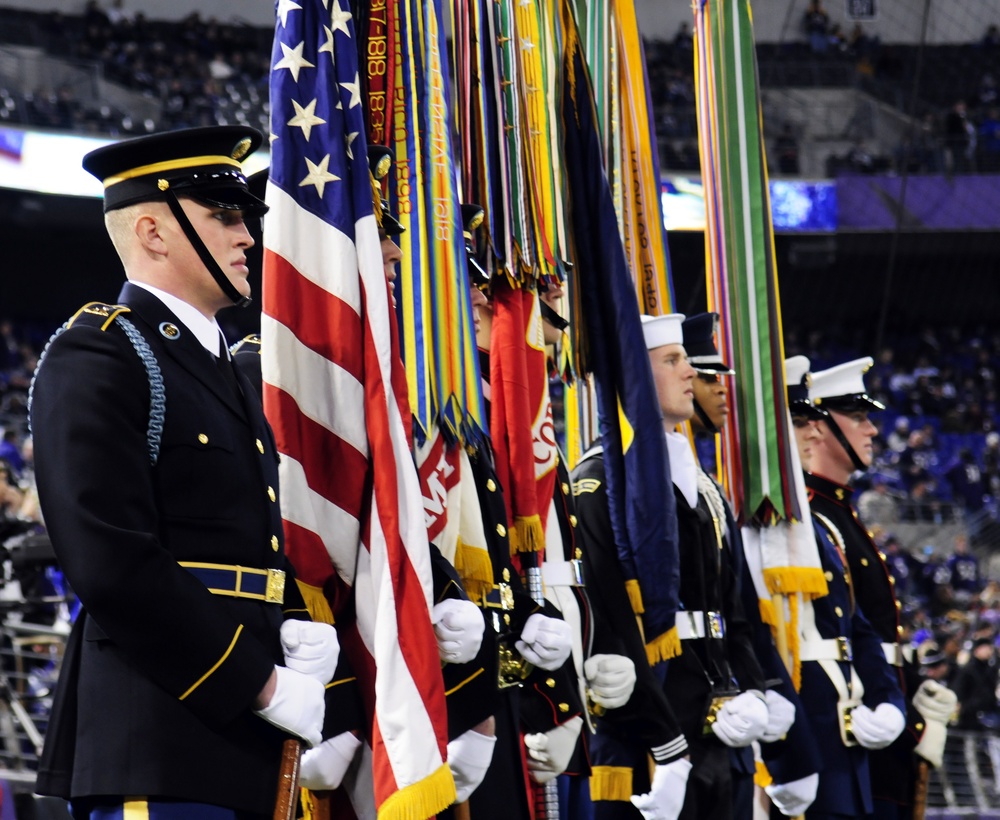 The Veterans Benefits Administration (VBA) helps service members transition out of military service, and assists with Veterans with education, home loans, life insurance and much more. Service members, Veterans, their families, and Survivors are invited to request information on VA Benefits including disability compensation, pension, fiduciary, education, Veteran Readiness and Employment (VR&E), Home Loans, and Insurance. In addition to information on VA Benefits Veterans may initiate an intent to file and request assistance with filing compensation and pension claims. Visit regional office websites to learn about the services the regional office provides, directions to the facility, hours of operation, and the leadership team that serves the regional office.
The Veterans Benefits Administration (VBA) helps service members transition out of military service, and assists with Veterans with education, home loans, life insurance and much more. Service members, Veterans, their families, and Survivors are invited to request information on VA Benefits including disability compensation, pension, fiduciary, education, Veteran Readiness and Employment (VR&E), Home Loans, and Insurance. In addition to information on VA Benefits Veterans may initiate an intent to file and request assistance with filing compensation and pension claims. Visit regional office websites to learn about the services the regional office provides, directions to the facility, hours of operation, and the leadership team that serves the regional office.
Find out if you can get VA health care as a Veteran
The following four categories of Veterans are not required to enroll but are urged to do so to permit better planning of health resources:
- Veterans with a service-connected (SC) disability rated at 50% or more.
- Veterans seeking care for a disability the military determined was incurred or aggravated in the line of duty, but which VA has not yet rated, within 12 months of discharge.
- Veterans seeking care for a SC disability only or under a special treatment authority.
- Veterans seeking health registry examinations. VA’s health registry evaluation is a free, voluntary medical assessment for Veterans who may have been exposed to certain environmental hazards during military service. The evaluations alert Veterans to possible long-term health problems that may be related to exposure to specific environmental hazards during their military service. VA has established several health registries to track and monitor the health of specific groups of Veterans. You may be eligible to participate in one or more of these health registries: Agent Orange Registry, Airborne Hazards and Open Burn Pit Registry, Gulf War Registry (includes Operations Iraqi Freedom and New Dawn), Ionizing Radiation Registry, Depleted Uranium Follow-Up Program, and Toxic Embedded Fragment Surveillance Center. Use the chart below to help determine your eligibility.
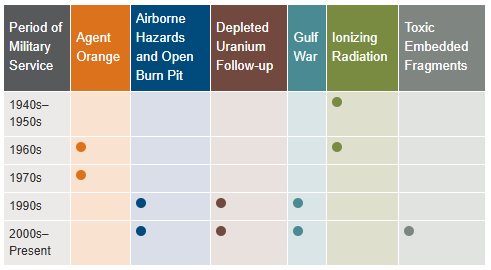
Find out how to apply for VA health care benefits as a Veteran or service member. For other mental health services, contact a VA medical center for information on eligibility and treatment options.
Community Care (Mission Act)
The MISSION Act became law in 2018, bringing the VA’s previous Veterans Choice Program to an end and establishing the Community Care Program. VA provides health care for Veterans from providers in your local community outside of VA. Veterans may be eligible to receive care from a community provider when VA cannot provide the care needed. This care is provided on behalf of and paid for by VA. Community care is also available to Veterans based on certain conditions and eligibility requirements, and in consideration of a Veteran’s specific needs and circumstances. VA offers urgent care services to eligible Veterans at in-network urgent care clinics to treat minor injuries and illnesses that are not life-threatening, such as colds, strep throat, sprained muscles, and skin and ear infections. Community care must be first authorized by VA before a Veteran can receive care from a community provider.
Vet Centers in VISN 20
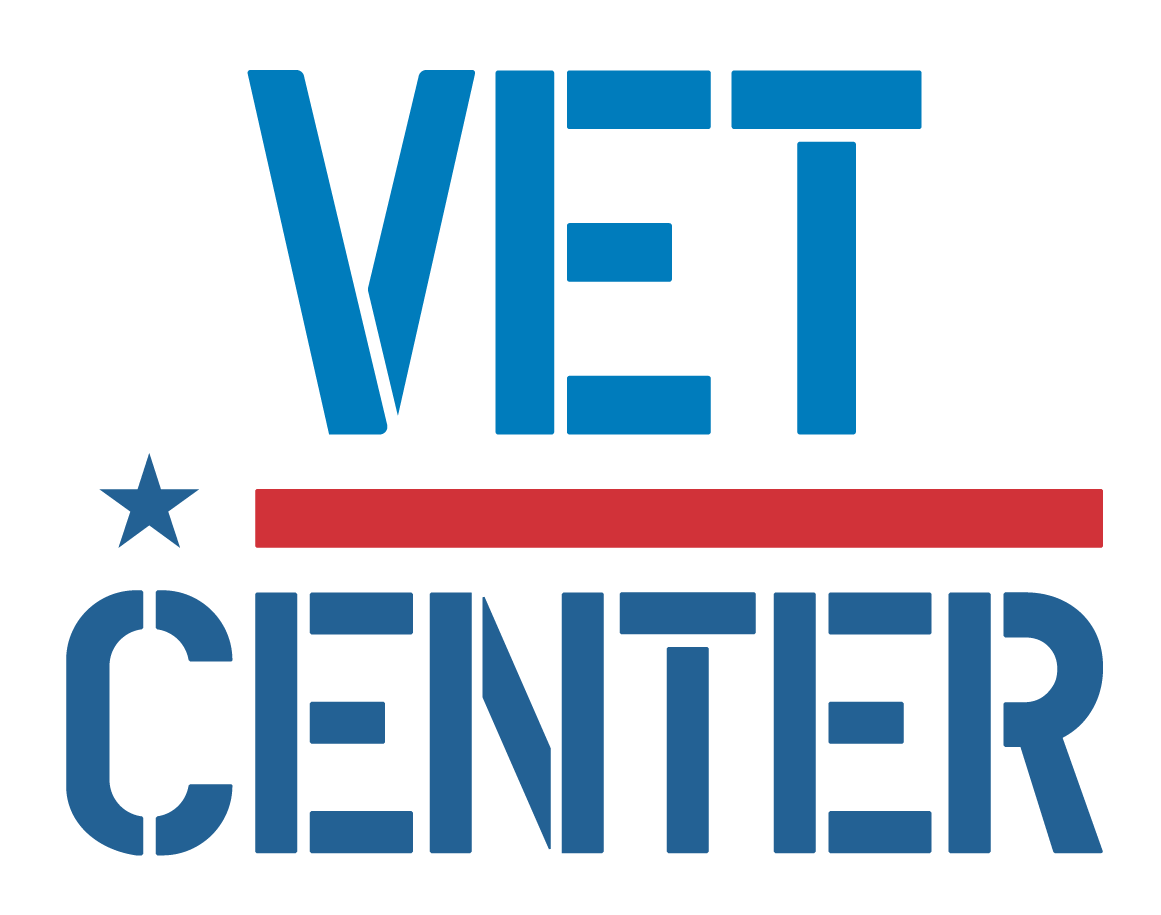 Vet Centers in VISN 20 are community-based counseling centers that provide a wide range of social and psychological services, including professional readjustment counseling to eligible Veterans, active-duty Army, Navy, Marine Corp, Air Force, Space Force, and Coast Guard service members, including National Guard and Reserve components, and their families. 1-877-927-8387 is an around the clock confidential call center where combat Veterans and their families can call to talk about their military experience or any other issue they are facing in their readjustment to civilian life. The staff is comprised of combat Veterans from several eras as well as families members of combat Veterans. This benefit is prepaid through the Veteran’s military service.
Vet Centers in VISN 20 are community-based counseling centers that provide a wide range of social and psychological services, including professional readjustment counseling to eligible Veterans, active-duty Army, Navy, Marine Corp, Air Force, Space Force, and Coast Guard service members, including National Guard and Reserve components, and their families. 1-877-927-8387 is an around the clock confidential call center where combat Veterans and their families can call to talk about their military experience or any other issue they are facing in their readjustment to civilian life. The staff is comprised of combat Veterans from several eras as well as families members of combat Veterans. This benefit is prepaid through the Veteran’s military service.
Alaska
| Anchorage Vet Center (Anchorage, AK) | Fairbanks Vet Center (Fairbanks, AK) |
| Kenai Vet Center Outstation (Soldotna, AK) | Wasilla Vet Center (Wasilla, AK) |
Idaho
| Boise Vet Center (Boise, ID) | East Idaho Vet Center (Idaho Falls, ID) |
Oregon
| Central Oregon Vet Center (Bend, OR) | Eugene Vet Center (Eugene, OR) |
| Grants Pass Vet Center (Grants Pass, OR) | Portland, OR Vet Center (Portland, OR) |
| Salem Vet Center (Salem, OR) |
Washington
Plan your trip to VA
 In 1946, Veterans Canteen Service (VCS) was established by law to provide comfort and well-being to America’s Veterans. With our many retail stores, cafés and coffee shops across the country, we serve those who have served our country. We are a self-sustaining entity providing merchandise and services to Veterans enrolled in VA’s healthcare system, their families, caregivers, VA employees, volunteers and visitors. We are honored to give back to the VA community through many programs established for the health and well-being of our nation’s heroes. Revenues generated from VCS are used to support a variety of programs, such as VA’s Rehabilitation Games, Fisher Houses, Poly-Trauma Centers for OIF/OEF/OND Veterans, disaster relief efforts, Substance Abuse Cessation, VA’s Homelessness initiatives, Women Veterans, Veteran Suicide Prevention and other activities.
In 1946, Veterans Canteen Service (VCS) was established by law to provide comfort and well-being to America’s Veterans. With our many retail stores, cafés and coffee shops across the country, we serve those who have served our country. We are a self-sustaining entity providing merchandise and services to Veterans enrolled in VA’s healthcare system, their families, caregivers, VA employees, volunteers and visitors. We are honored to give back to the VA community through many programs established for the health and well-being of our nation’s heroes. Revenues generated from VCS are used to support a variety of programs, such as VA’s Rehabilitation Games, Fisher Houses, Poly-Trauma Centers for OIF/OEF/OND Veterans, disaster relief efforts, Substance Abuse Cessation, VA’s Homelessness initiatives, Women Veterans, Veteran Suicide Prevention and other activities.
VCS operates over 200 Patriot Stores in Veterans Administration (VA) Medical Centers nationwide. Many of our stores have been recently updated and expanded to provide our customers with a modern, clean and comfortable shopping experience. Our stores welcome our customers with wider aisles, wood-like floors, enhanced lighting and directional signage. PatriotStores have expanded hours of operation to provide service for customers on weekends at most locations.
The Patriot Cafe is the best place in the VA Medical Center to enjoy delicious, freshly prepared breakfast or lunch served hot or cold each weekday. Providing Veterans, their families, VA employees, volunteers and visitors a place to relax and enjoy a meal or take-out for their convenience. With a wide variety of food from traditional comfort food, specialized menu selections and a large assortment of healthy choices; there is something for everyone's taste buds.
Hospital Service Directory
To find out whether there is a van near you use the Disabled American Veterans (DAV) Hospital Service Coordinator Directory to contact your nearest HSC for information or assistance. Please remember that the DAV Transportation Network is staffed by volunteers; therefore, it is unable to cover every community. The vans are driven by volunteers, and the rides coordinated by more than 133 Hospital Service Coordinators around the country. Our nation’s heroes travel around the globe to protect our freedoms—it’s only right that we return their dedication. Volunteering to drive a Vet ensures that even those living remotely from VA hospitals can make their appointments and never go without the treatment they need. Learn more about the DAV transportation network through the VISN 20 NewsFlash Resources section.
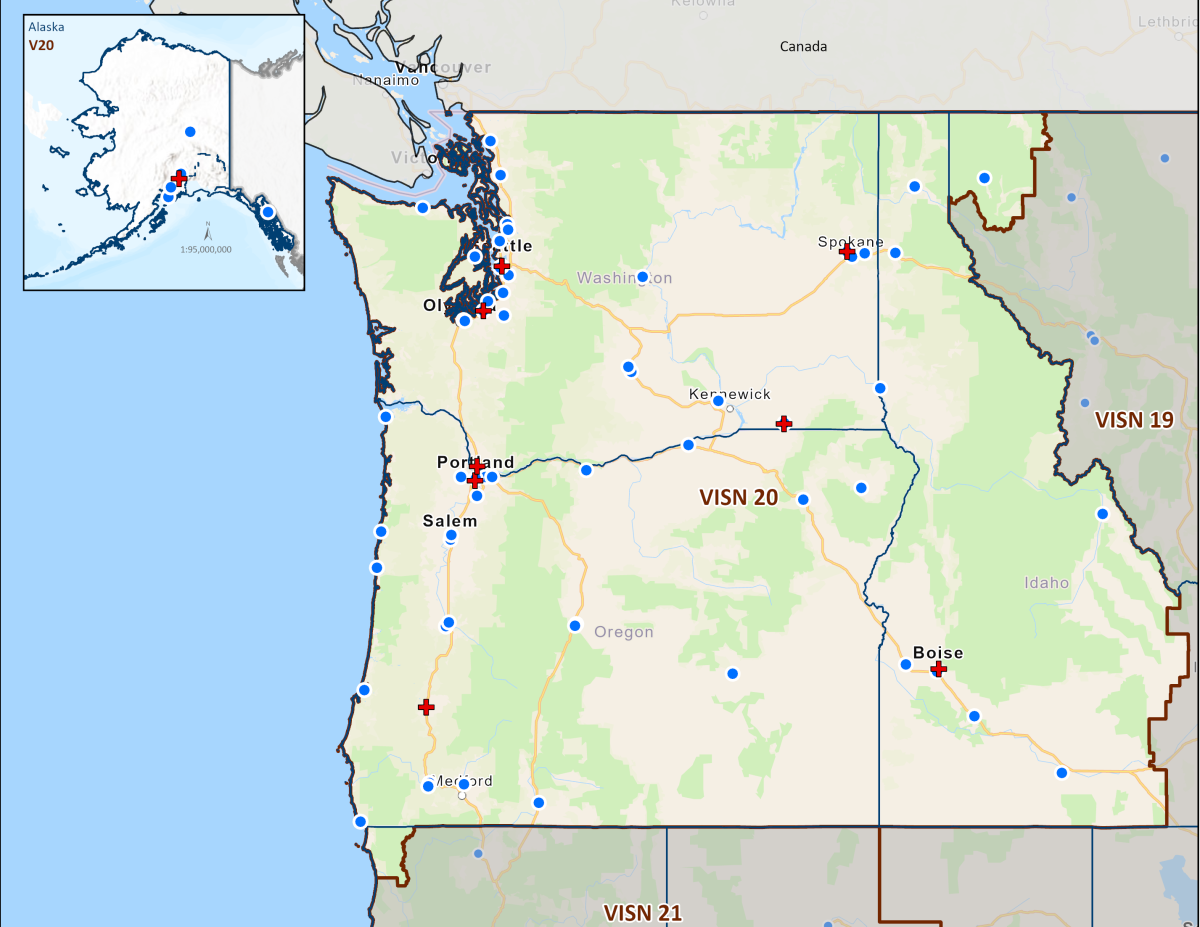 Today's VHA - the largest of the three administrations that comprise the VA - continues to meet Veterans' changing medical, surgical, and quality-of-life needs. VHA is the largest integrated health care system in the United States, providing care at 1,321 health care facilities, including 172 VA Medical Centers and 1,138 outpatient sites of care of varying complexity (VHA outpatient clinics) to over 9 million Veterans enrolled in the VA health care program. There are 18 Veterans Integrated Service Networks (VISNs) in VHA operating as regional systems of care to better meet local health care needs and provides greater access to care. In the Pacific Northwest, VISN 20 serves Veterans in Alaska, Oregon, Washington, most of Idaho, and one county each in California and Montana. Spanning 23% of the US land mass, VISN 20 is the largest geographic region of VA. Operating across three time zones over 817,417 square miles, VISN 20 is home to 273 federally recognized American Indian and Alaskan Native tribes. According to DoD, American Indians and Alaska Natives have one of the highest representations in the United States Armed Forces. VA consults with American Indian and Alaska Native tribal governments to develop partnerships that enhance access to services and benefits by Veterans and their families. VA is committed to ensuring that Native American Veterans and their families are able to utilize all benefits and services they are entitled to receive. As of the end of FY2024, 39% of VISN 20 enrollees resided in rural or highly rural areas.
Today's VHA - the largest of the three administrations that comprise the VA - continues to meet Veterans' changing medical, surgical, and quality-of-life needs. VHA is the largest integrated health care system in the United States, providing care at 1,321 health care facilities, including 172 VA Medical Centers and 1,138 outpatient sites of care of varying complexity (VHA outpatient clinics) to over 9 million Veterans enrolled in the VA health care program. There are 18 Veterans Integrated Service Networks (VISNs) in VHA operating as regional systems of care to better meet local health care needs and provides greater access to care. In the Pacific Northwest, VISN 20 serves Veterans in Alaska, Oregon, Washington, most of Idaho, and one county each in California and Montana. Spanning 23% of the US land mass, VISN 20 is the largest geographic region of VA. Operating across three time zones over 817,417 square miles, VISN 20 is home to 273 federally recognized American Indian and Alaskan Native tribes. According to DoD, American Indians and Alaska Natives have one of the highest representations in the United States Armed Forces. VA consults with American Indian and Alaska Native tribal governments to develop partnerships that enhance access to services and benefits by Veterans and their families. VA is committed to ensuring that Native American Veterans and their families are able to utilize all benefits and services they are entitled to receive. As of the end of FY2024, 39% of VISN 20 enrollees resided in rural or highly rural areas.
VA Medical Centers within VISN 20
Colonel Mary Louise Rasmuson Campus of the Alaska VA Healthcare System, Anchorage, Alaska
VA Boise Medical Center of the Boise VA Healthcare System, Boise, Idaho
VA Portland Medical Center of the Portland VA Healthcare System, Portland, Oregon
VA Roseburg Medical Center of the Roseburg VA Healthcare System, Roseburg, Oregon
VA White City Medical Center of the VA Southern Oregon Healthcare System, White City, Oregon
VA Seattle Medical Center of the VA Puget Sound Healthcare System, Seattle, Washington
Mann-Grandstaff Department of Veterans Affairs Medical Center, Spokane, Washington
Jonathan M. Wainwright Memorial VA Medical Center of the VA Walla Walla Healthcare System, Walla Walla, Washington
VA Puget Sound Health Care System (VAPSHCS) serves Veterans from a five-state area in the Pacific Northwest with two main divisions: American Lake VA Medical Center and Seattle VA Medical Center. Veterans Medical Centers are also located in Spokane, Vancouver, and Walla Walla. VA Outpatient Clinics and Vet Centers are located in Bellingham, Bellevue, Bremerton, Edmunds, Everett, Federal Way, Lacey, Mount Vernon, Olympia, Port Angeles, Puyallup, Richland, Renton, Silverdale, Seattle, Spokane, Union Gap, Vancouver, Walla Walla, Wenatchee, and Yakima.
VA Portland Health Care System (VAPORHCS) serves Veterans in Oregon and Southwest Washington with two main divisions: Portland VA Medical Center and Vancouver VA Medical Center. Veterans Medical Centers are also located in Roseburg, White City, and Vancouver, Washington. VA Outpatient Clinics and Vet Centers are located in Astoria, Bend, Boardman, Brookings, Eugene, Fairview, Grants Pass, Hines, Hillsboro, Klamath Falls, LaGrande, Lincoln City, Newport, Portland, Salem, The Dalles, and West Linn.
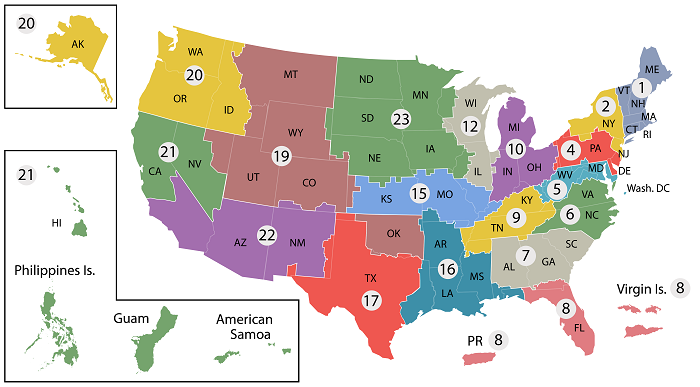
- VISN 1: VA New England Healthcare System
- VISN 2: New York/New Jersey VA Health Care Network
- VISN 4: VA Healthcare - VISN 4
- VISN 5: VA Capitol Health Care Network
- VISN 6: VA Mid-Atlantic Health Care Network
- VISN 7: VA Southeast Network
- VISN 8: VA Sunshine Healthcare Network
- VISN 9: VA MidSouth Healthcare Network
- VISN 10: VA Healthcare System
- VISN 12: VA Great Lakes Health Care System
- VISN 15: VA Heartland Network
- VISN 16: South Central VA Health Care Network
- VISN 17: VA Heart of Texas Health Care Network
- VISN 19: Rocky Mountain Network
- VISN 20: Northwest Network
- VISN 21: Sierra Pacific Network
- VISN 22: Desert Pacific Healthcare Network
- VISN 23: VA Midwest Health Care Network



















